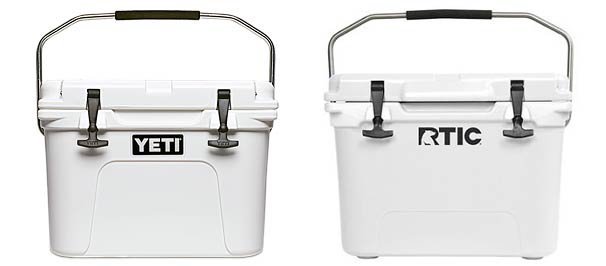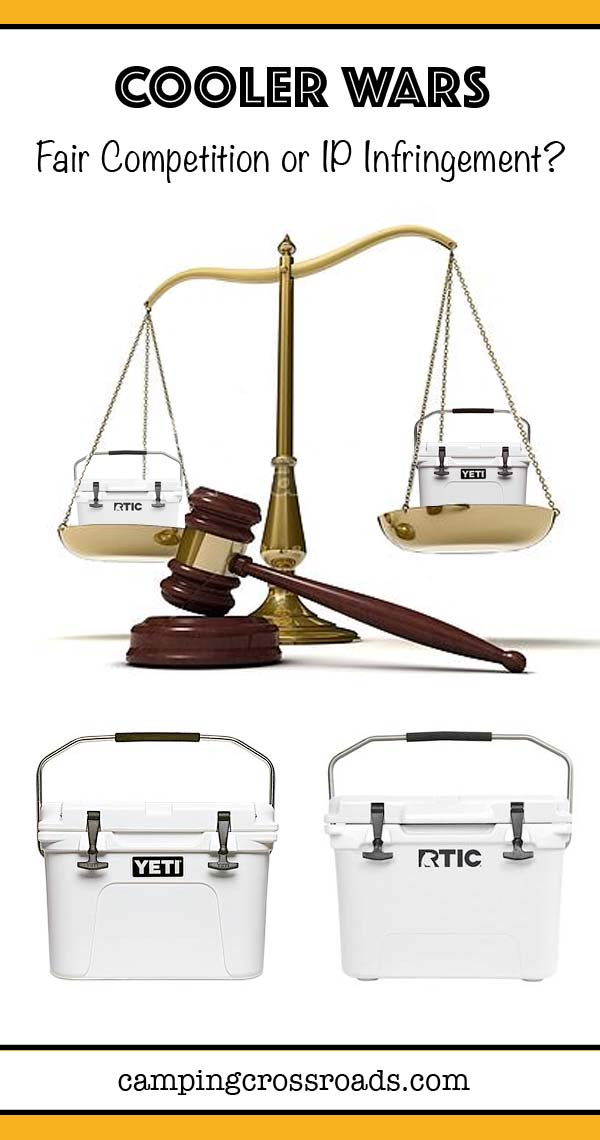Yeti vs RTIC Lawsuit: Fair Competition or IP Infringement?
After the Yeti vs RTIC Lawsuit Enthusiasts Question The Pros and Cons of ‘Knock-offs’

In February 2017, Yeti Coolers settled a lawsuit against RTIC Coolers. If you didn’t hear about the Yeti vs RTIC lawsuit, you probably would understand why there was going to be one. Basically, both coolers look so alike, you had to see them up close to notice the difference.
However, even though RTIC may have basically stolen YETIs cooler design, many people saw this as a good thing. Because they could now purchase a quality cooler at a fraction of the price.
So are “knockoffs’ necessarily a bad thing?
About YETI

Yeti Coolers was founded by brothers Roy and Ryan Seinders in 2006 and is based in Austin (Texas). The brothers had a simple mission “build the cooler we’d use every day if it existed”.
Today, Yeti is viewed by many as a status symbol, drawing a following similar to Apple devotees. It is arguably the most well-known, premium cooler-of-choice for outdoor enthusiasts, pros, tailgaters and backyard barbecue kings.
Since its simple beginnings, the company has also expanded to include ice budgets, drinkware, and various other gear.
About RTIC

RTIC was established in 2014, by twin brothers John and Jim Jacobsen. Based in Cypress (Houston), RTIC entered the market with a unique business strategy that seemed to center directly on competing against Yeti. They looked at Yeti’s success, identified the 10-fold price gap between Yeti and its competitors, and saw an opportunity in the market for a mid-priced product.
Where RTIC found themselves in trouble was in their product design. Their coolers looked almost exactly like YETI coolers. To the point that many of their products competed on feature-by-feature bases with YETI, right down to the rubber hatch closures. Adding insult to injury, RTIC used slogans such as “Over Built, not Over Priced” and “Like a YETI, but half the price” to advertise their products. The RTIC website also featured Yetis’ price list.
If that was not an invitation for YETI to sue them, I don’t know what would be.
The Yeti vs RTIC Lawsuit
In the wake of RTICs’ success, YETI launched patent and trademark infringement lawsuits against RTIC. And you can certainly understand why.
YETI also came at RTIC for trade dress – a legal term that refers to the physical characteristics of a product and its packaging. Especially this means, if you swapped the logos on the YETI and RTIC products, you would not be able to tell them apart.
Whilst the details were not made public, the YETI vs RTIC lawsuit was settled after several months of back and forth. It was reported that YETI and RTIC came to an amicable settlement. RTIC released a statement saying they wanted to conclude the lawsuit “for the purposes of avoiding the additional costs and uncertainty of continued litigation”. YETI received some financial compensation from RTIC. RTIC was also required to redesign their product line.
Are “knock-offs” necessarily a bad thing?
The YETI vs RTIC Lawsuit proves the importance of patents in business and product design. And when we talk about intellectual property issues, such as knock-offs or product copying, there is often an inherent sense that copying is a bad thing. Not just bad, but downright immoral.
‘Freeloading’, ‘pirates’ and ‘copycats’ are terms usually thrown around. But nothing breeds copycats like a successful business venture, such as the YETI brand. When a new business idea is incubated and executed successfully, cloners naturally emerge and imitate.
Oscar Wild once said that ‘imitation is the sincerest form of flattery’. So are knock-off necessarily a bad thing in business? Was RTICs strategy to mimic YETI coolers valid competition, and in the interest of consumers and the marketplace? Or an outrageous exploitation of their IP?
PRO: Introduction of valid competition
The majority of copying that we see in the marketplace is usually on design and price. And in some cases, this has some positive effects. RTIC produced a high-end product, similar to YETI but for less. The introduction of the RTIC cooler has been good for consumers, in the sense that copying has bread competition. Providing consumers with an option they would not have otherwise had.
PRO: Growth of an industry
The key to RTICs success has been selling a high-end product for less. RTIC has made a quality product more accessible to a new market segment and in-turn expanded the cooler and outdoor industry. Making it a success, creating jobs and establishing a more robust sector.
In fact, since shipping its first cooler in September 2015, RTIC has generated nearly $200 million in revenue and they now employ about 100 people1.
It is fair to say, that in these circumstances, copycat behavior has contributed in a very positive way to the growth of an industry.
CON: Exploitation of IP > Lack of Innovation
We know that to copy something is wrong; it’s been ingrained in us since we were children. And when you create something, you are proud of its originality and inventiveness (and rightly so). You would be horrified if someone copied you.
So it is easy to understand why YETI sued RTIC. In fact, Yeti has been pretty protective of it’s brand in including a Yeti lawsuit against Walmart and Ozark.
However, what often happens when a copycat enters the market, is that instead of making a better more innovative product they end up diluting the product. The result being diluted propositions – a marketplace so crowded that consumers can’t tell the difference between products. And often this breeds complacency and lack of innovation.
RTIC is a habitual copier and infringer of YETI products and intellectual property. So it was no surprise when YETI filed a lawsuit against RTIC. However, RTIC’s success has been the result of their copycat business model. Consumers have also benefited through the introduction of competition into the marketplace.
It will be interesting to see what happens now that RTIC has been ordered to re-design their product lines as a result of the YETI vs RTIC lawsuit. How will RTIC relaunch themselves in the market? Will they continue to build on their successful business model ‘to copy YETI products’ until they are forced out? Will YETI see this as an opportunity to innovate, rather than just rely on lawsuits to push competition out of the marketplace? Only time will tell.
What are your thoughts on copycats in the marketplace?

